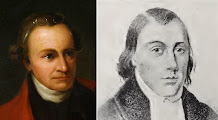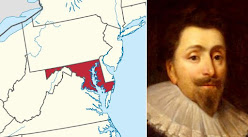Around the same time (1775), the Baptists also asked "that they might be permitted to serve God in their own way without interference, to hold their own pastors, and to be married, buried, etc., without having to pay the preachers of other parties. The Legislature approved these quite just wishes, and decreed that henceforth all church parties should be on an equal footing with each other. The Episcopalians and Episcopal Methodists, however, opposed this ordinance with the utmost zeal. They contended that history taught that no state could exist without a state religion, — that the old order must be maintained etc. etc. At last, however, (1776) the legislature revoked all the laws by which dissenting opinions and creeds had been prohibited and punished. The Episcopal Church remained in possession of all the property which it at that time held; but henceforth no one was obliged to pay it dues who belonged to another confession. Each church fellowships now enjoyed equal rights and could move freely.
In 1784 one tried again to use the state power for the interest of the church. For on many sides, as had been repeatedly desired before, the levying of a general tax "for the support of religion" was desired. The most vehement speeches were made for and against this motion in the legislature. For instance, the famous Patrick Henry was decidedly in favor of the measure, and Dr. John B. Smith, a Presbyterian, was just as vigorously opposed to it. The law in question had already been read twice, when it was decided to submit it to the whole people in order to hear their opinion. This was against the same; the matter was dropped forever. <p. 29>
The first settlers in Maryland (Nov. 1632) were mostly Catholics who had been led there by Lord Calvert (Baltimore). In 1649, the legislature, which also consisted mostly of Roman Christians, decreed that anyone who professed to believe in Jesus Christ should be free to practice his religion at any time. Those who would insult or abuse others on account of their faith were threatened with fines. Whoever would speak dishonestly of the Holy Virgin or the holy apostles was to pay £5, but whoever blasphemed God was to be punished by death. Thus the Catholics of Maryland were the first in America who guaranteed to all Christians the free exercise of religion, but at the same time again — restricted or endangered it; for "to speak dishonorably of the holy virgin" can be called in Roman terms everything that violates her invented world government and her immaculate conception. The consequence of that declaration, however, was that adherents of every Christian confession flocked to Maryland. (* Grahame's Hist., p. 283).
But Lord Baltimore's views and measures were not approved in England; he was accused of acting partial to the Catholics, and even compelled to fill all the offices of government with Protestants. And after even the government of the colony had been taken from him, and [Edmund] Andros had become royal governor (1692), the Catholics were forcibly suppressed, and the "Church of England" was proclaimed as the only one recognized by law. In 1692 an act was passed dividing all the counties into parishes and regulating the income of the parish priests. Every adult white citizen, of whatever confession he might be, was to give the parson 40 pounds of tobacco annually, and every negro and negro woman over 16 years of age 16 pounds. The pastors were appointed by the governor; the other church officers were chosen by the Protestant people.
Thus Maryland had all at once obtained a State Church, and the wholly Protestant Legislature, protected from above and encouraged by the example of the Legislature, now began with shameless tyranny to distinguish the "Episcopal Church," but to suppress the Roman Church. The latter was entirely forbidden to worship in public, and to give any instruction in schools. A law, first enacted in 1704 and renewed in 1715, imposed fines and imprisonment on any Catholic priest who attempted to convert a Protestant. Those who would say mass or teach the young were to be transported to England to suffer the punishment that the laws of the mother country had established for such offenses.
Soon, however, the authorities had to convince themselves that this tyrannical law could not be carried out in all its severity. As late as 1704 the Legislature permitted the Catholic priests to perform their office in private houses, and Queen Anne at last commanded that the law of 1714 also be left unimplemented for the time being. The Catholics now enjoyed more tranquility; but the Episcopal Church remained for a long time the ruling one, and as before all citizens, whether Protestants or not, had to contribute to its maintenance.
It was not until November 3, 1776, that the [Maryland] Legislature enacted the Declaration of Rights, in which the actual separation of church and state was declared. It states [Article XXXIII]: "That it is the duty of every man to serve God in the manner which, in that opinion, best suits him, and that all persons professing the Christian religion are equally entitled to the protection of their religious liberty; That no man shall be molested by any law in his person or property, on account of his religious opinions, or creed, or worship; unless he shall, under pretense of religion, disturb the good order, peace, and safety of the state, or violate the laws of morality, or offend others in their natural, civil, and religious rights." Likewise, it was said, "that no person shall be compelled to attend or maintain the public worship of any church party"; but the Legislature still reserved to itself the right "to lay a general and equal tax, at its pleasure, for the preservation of the Christian religion"; but in so doing, every individual was to have the right either to determine for himself to what church his gift should be given, or to pay the same for the poor in general. — In Maryland, too, the Episcopalians remained in possession of all the church property which they held at the time of the enactment of that Declaration; but the support from the State ceased as of November 1, 1776. From Virginia and Maryland many preachers returned to England at that time, partly because they detested the Revolution, partly because they feared that the church could not endure if its support were left to the good will of the people.





No comments:
Post a Comment
Comments only accepted when directly related to the post.